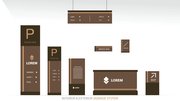News
Canton, Ohio tourist bureau embraces kiosks, but local governments hold off over costs
April 11, 2017
Visit Canton, Stark County, Ohio’s convention and visitors’ bureau, has installed 23 interactive kiosks as a way to disseminate information, promote area businesses or accept property tax and court fines payments, according to The Canton Repository.
However, the city of Massillon last year tabled approving 11 information kiosks at outdoor locations throughout the city. And Canton has rejected the concept due to the costs.
Visit Canton says it has installed 23 indoor kiosks with 42-inch screens at 23 locations in the Stark County area since 2014 at a cost of about $120,000. The kiosks are at the Akron-Canton Airport, tourist attractions such as the Pro Football Hall of Fame, Belden Village Mall, Canton Memorial Civic Center, Hartville Market Place, the Amish Door Village and some hotels.
The indoor kiosks, provided by CTM Media, cost about $6,000 each and are connected to the Internet. The device allows visitors to access information about tourist attractions, restaurants, hotels and other locations. They can view basic background information, videos, see their locations on maps, view menus and have information texted or emailed to them. Each kiosk has a color touchscreen display. The host of each kiosk pays the electricity costs.
At least 90 attractions or businesses pay about $500 a year to be listed on the kiosks. They submit and update information, pictures and videos to be included in their kiosk profile through an online form.
The company's chief executive officer, Marc Albert, told Massillon city council the kiosks, which would cost a total of $200,000, could be better than a mobile app because the information was already cued up to provide quick access. Paid advertising would pay for the kiosks, with the city only having to cover the cost of electricity or up to $110 a month. However, the city council tabled plans to install the kiosks in part due to concerns that the kiosks would take away from downtown's historic ambiance.
While advertising would have paid for the cost of the actual kiosks, the city would have been responsible for paying about $5,000 to cover the cost of a base mount and wiring per kiosk. With 20 proposed machines, the cost would have been $100,000.
 ChatGPT
ChatGPT Grok
Grok Perplexity
Perplexity Claude
Claude









